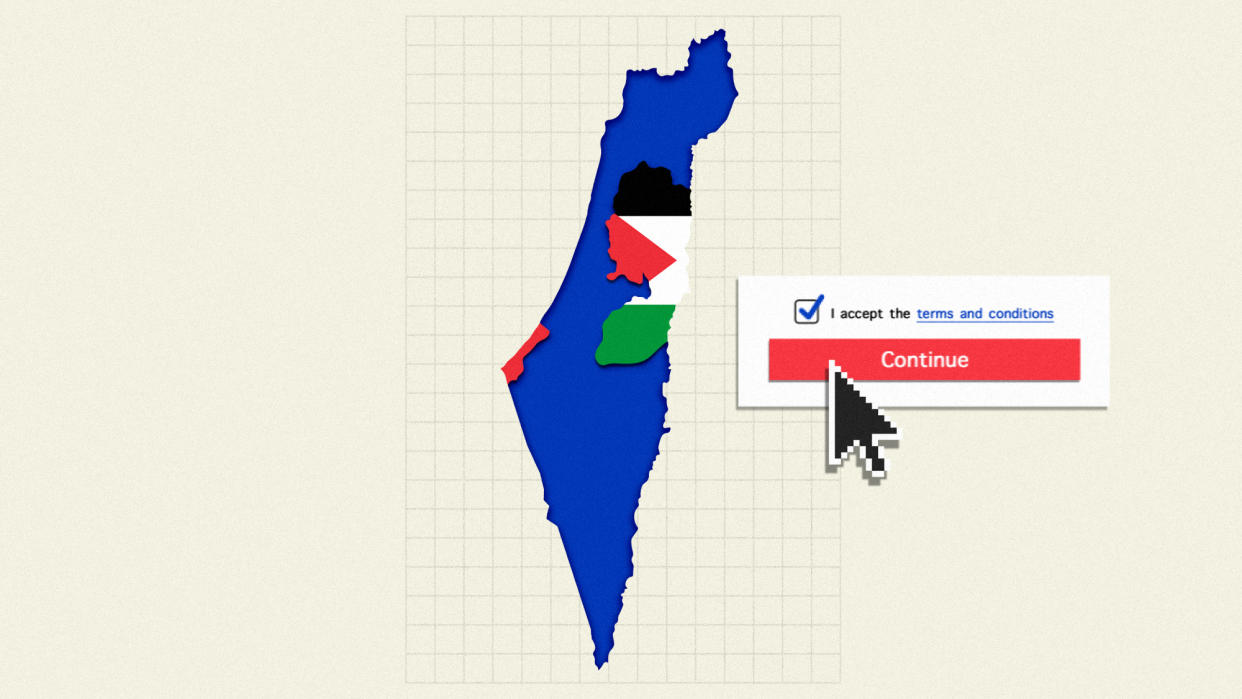Will America recognize a Palestinian state?

- Oops!Something went wrong.Please try again later.
The Israel-Hamas war could end with a dramatic development: The formal U.S. recognition of a sovereign Palestinian state.
Secretary of State Antony Blinken, Axios reported, has asked staffers to review policy options "on possible U.S. and international recognition of a Palestinian state" at the conclusion of the Gaza war. It's a "highly sensitive" topic, given that longstanding U.S. policy has favored statehood for the Palestinians only after "direct negotiations between Israel and the Palestinian Authority." That's unlikely to happen soon: Israeli leader Benjamin Netanyahu is "vehemently" opposed to statehood.
This possibility — it's not a formal policy shift yet — comes after other more overt moves toward Palestinian statehood. Politico reported U.K. Foreign Secretary David Cameron is "considering a push" to recognize Palestine at the United Nations. "We should be starting to set out what a Palestinian state would look like – what it would comprise, how it would work," Cameron said this week.
There would be fierce resistance from Israeli leadership. Netanyahu made it clear in mid-January that he won't agree to any scenario that gives up his government's authority over the Gaza Strip. "I will not compromise on full Israeli security control over all the territory west of Jordan — and this is contrary to a Palestinian state," he said in a social media post. If that's the case, what's the path forward for Palestinian statehood?
What did the commentators say?
Palestinian recognition must be part of a broad U.S. effort to resolve "the widening crisis in the Middle East," columnist Thomas Friedman argued in The New York Times. A "demilitarized" state in control of Gaza and the West Bank would have to have "security capabilities to ensure that this state was viable and that it could never threaten Israel." That would be good for Israeli security. The old policy — of propping up Hamas through back-door means "to ensure that there would be no unified Palestinian partner" for statehood — clearly didn't work.
"The State Department has lost the plot," Noah Rothman countered at National Review. While such recognition might have benefits (enabling Israeli-Saudi Arabian rapprochement, for example) it might not solve Israel's security problem. "Simply deeming Palestine a state as a direct result of Hamas's attack will not impose sobriety on the Palestinian Authority." It is "monomaniacal" for America's diplomatic officials to push Palestinian statehood "in the wake of the worst terrorist attack on the Jewish state in its history."
"Israel must say yes to a Palestinian state," Haaretz editorialized. America and the U.K. are showing signs of recognizing "that it is impossible to go back to diplomatic foot-dragging on the Israel-Palestinian conflict." Netanyahu and other Israeli leaders have spent decades resisting nudges to allow the creation of a Palestinian state. That's no longer tenable. "Netanyahu's diplomatic stonewalling exploded in his face on Oct. 7." That makes recognition "an urgent necessity."
What next?
U.S. efforts could take several different forms, Axios reported, including allowing the United Nations to admit Palestine as a full member state. (Palestine was allowed into the U.N. as an "observer state" in 2012, but without full recognition.) It could also encourage other countries to recognize Palestine.
But any move toward recognition would encounter opposition from American conservatives, The Washington Free Beacon reported. Such action "would be the worst betrayal of our strongest ally in the Middle East," said Rep. Tom Emmer (R-Minn.). A Palestinian state would be "an enclave for global terrorism and an existential threat to Israel," added Sen. Tom Cotton (R-Ark.)
That anger may be why the State Department is downplaying talk of Palestinian recognition, The Times of Israel reported. The United States, after all, has long favored a "two-state solution" as its official policy for the Israel-Palestine conflict. A department spokesperson said that means nothing has really changed. "We have made quite clear publicly that we support the establishment of an independent Palestinian state," said Matt Miller. "That has been the policy of the United States for some time." What that looks like, though, could soon change.

